Digitizing archives in Asia
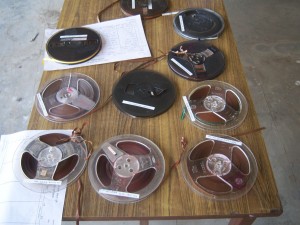 Real treasures can be found in the archives of the state broadcasters Radio the Voice of Vietnam, Radio Nepal and the Sri Lanka Broadcasting Corporation: original audio recordings from the 1930s, historic speeches, old musical recordings. All of that would be lost without painstaking restoration and archiving work.
Real treasures can be found in the archives of the state broadcasters Radio the Voice of Vietnam, Radio Nepal and the Sri Lanka Broadcasting Corporation: original audio recordings from the 1930s, historic speeches, old musical recordings. All of that would be lost without painstaking restoration and archiving work.
The three Asian broadcasters have been professionalizing their methods of archiving and digitizing audio tape as part of a long-term DW-AKADEMIE project. At this year’s International Association of Sound and Audiovisual Archives annual conference held in September 2011 in Frankfurt, Germany, three head archivists showed how their countries were preserving their cultural heritage with archive management and highly modern techniques.
![]() read more
read more
Kampala to Bonn with Heinz Kühn Foundation
In a few days time I will be going back to my country having spent four months in Germany. I will be going back a better person having learned a lot, but most importantly, I will be going back as an experienced journalist. And one that has just started to live their dream thanks to the Heinz Kühn Foundation.
The Heinz Kühn Foundation is funded by the state of North Rhine Westphalia and works to support and develop the skills of young journalists. It offers grants to German journalists to travel to developing countries and also offers journalists from developing countries to come to Germany for training and professional development.
![]() read more
read more
Histoires africaines à Cotonou
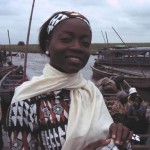
Sans zémijan - Lurhielle, journaliste au Bénin
![]() read more
read more
Elections in Liberia and the role of journalists
On October 11, 2011, Liberia will hold its second democratic presidential and parliamentary elections since the end of the 1989-2003 civil war. Guest blogger Julia Bayer examines the role of journalists and the state of press freedom in Liberia.
Ranked 84 on Reporters Without Borders’ Press Freedom Index, Liberia has a long road ahead towards improving press freedom. However, the conditions for journalists working today have improved compared to those under the regime of Charles Taylor.
![]() read more
read more
7 tips on creating an effective Facebook link
For many, Facebook has changed the face of the media landscape for good. Along with other social networking sites, it’s an important way for news consumers to filter updates from their favorite sources or on events of particular interest to them. It’s also how they share stories amongst their circles of friends.
In turn Facebook and other social media platforms have become key distribution channels for news websites. So it’s all the more important for online news sources to effectively market their content to social media outlets.
German blogger Claus Hesseling has compiled some useful tips for journalists who want to make the most of that potentially added exposure. With his kind permission, you can read a translation of his summary below.
![]() read more
read more
What makes a good blog post?
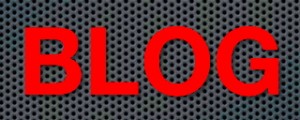 Blogs make publishing literally anything online a breeze. And whether you’re a radio, TV, print or online journalist, a blog can offer a creative space to experiment, or a digital companion to your published or broadcast work – a sort of personal digital notebook – or, it can be whatever you want it to be.
Blogs make publishing literally anything online a breeze. And whether you’re a radio, TV, print or online journalist, a blog can offer a creative space to experiment, or a digital companion to your published or broadcast work – a sort of personal digital notebook – or, it can be whatever you want it to be.
Increasingly, many media outlets are using blogs in a more formal way – often giving journalists the freedom to explore a topic in more depth or take readers behind the scenes of their work.
But while technology makes blogging easy, starting out as a blogger and actually writing something worth reading can be a daunting task.
Blogging is a little bit like a digital writing adventure. And even though you might think someone is a good writer or a good journalist, that doesn’t necessarily mean they’ll instantly be a good blogger.
So, what follows here are a few tips to bear in mind for writing a good blog post.
![]() read more
read more
10 tips on how to be a good host
 Audiences sure can put anchors to the test. They tend to listen to good friends for a long time, even when their buddies’ stories are rather boring. But when you are moderating, they rarely pay close attention.
Audiences sure can put anchors to the test. They tend to listen to good friends for a long time, even when their buddies’ stories are rather boring. But when you are moderating, they rarely pay close attention.
Frequently they’re busy doing something else, are impatient and fidgety. Sometimes they even leave you with no word of explanation. And if they do return their attention to you, they expect you to be as friendly and courteous as if nothing had ever happened.
Of course that is exactly what you will do without a trace of resentment. Here’s how:
1. Be a good interpreter. Convey and explain complex subject matter in a way that listeners can easily understand.
2. Be a good spokesperson. Pose questions as if you are representing the listener. You’ll come across best when your listeners have the feeling that they would have asked the very same questions.
3. Be prepared. Being well-prepared is half the battle. Read the newspapers every day and stay on top of the latest.
![]() read more
read more
Painting a different picture of Africa
Being part of the African Stories workshop in Cape Town, I was most excited about meeting fellow young journalists from all over Southern Africa. The first thing I noticed was that we have a lot in common. They, as journalists, want their voices to be heard and they are eager to tell their own stories. But even more so, they want to show the world who they are as Africans – and not leave that to media outlets outside of Africa, which in their view, often present a one-sided image of the continent.
“Western journalists often only concentrate on one area like poverty,” said Mathews Nthala, editor at MUVI TV in Zambia. “In this workshop, we are given the opportunity to show that there is a lot of potential in Africa. Many people are doing well in terms of entrepreneurship and self-empowerment. An African led empowerment, that to me sums up what African Stories is about.”
![]() read more
read more
5 pocket video camcorder tips
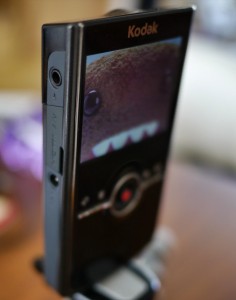 They’re small, relatively inexpensive and shoot high quality video. Pocket camcorders or “Flip” style video camcorders are a very useful tool for journalists, especially for producing video for the web.
They’re small, relatively inexpensive and shoot high quality video. Pocket camcorders or “Flip” style video camcorders are a very useful tool for journalists, especially for producing video for the web.
Just about all of the major camera manufacturers produce pocket video camcorders. And, it must be said that the HD video produced by many small point and shoot cameras and also smartphones now compete with these little wonders.
At present, the Kodak Zi8 is one of the main models the DW-Akademie uses during online journalism and web video courses. Flip is of course another well known brand, but these cameras are to be discontinued.
Whatever you use, it’s about the story and not the camera. But here are some of our tips for getting more out your camcorder and producing better quality web video.
![]() read more
read more
Producing “Radio for the People” in Vietnam
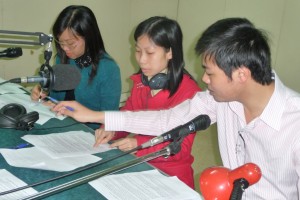 Radio listeners in Northern Vietnam’s Quang Ninh Province probably didn’t know what hit them earlier this year. Instead of drab propaganda programs, the radio was playing popular music interspersed with traffic information and listeners’ calls. And this new show was presented by a friendly host who was talking to the listeners at eye level. So far, radio hosts had sounded more like talking machines who thought it necessary to instruct the audience what to think.
Radio listeners in Northern Vietnam’s Quang Ninh Province probably didn’t know what hit them earlier this year. Instead of drab propaganda programs, the radio was playing popular music interspersed with traffic information and listeners’ calls. And this new show was presented by a friendly host who was talking to the listeners at eye level. So far, radio hosts had sounded more like talking machines who thought it necessary to instruct the audience what to think.
The program the listeners of QTV radio in Quang Ninh Province were hearing was “Rush Hour”, a one-hour morning show that the station had just started with the help of DW-AKADEMIE, Friedrich-Ebert Foundation and Vietnam’s Academy of Journalism and Communication.
![]() read more
read more




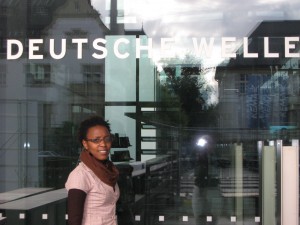
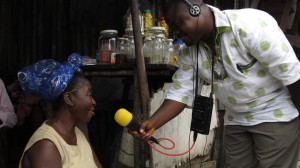






Feedback